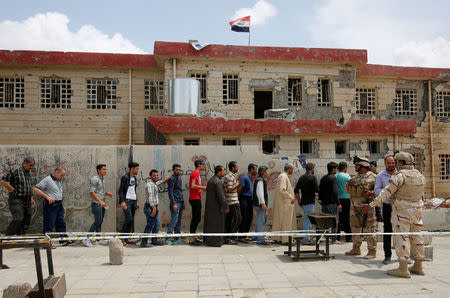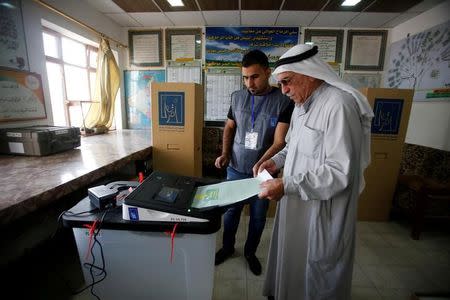"We never cared but now we have to" - Mosul votes for first time since IS defeat
By Raya Jalabi
MOSUL, Iraq (Reuters) - Um Laila and Farida Hassan had not seen each other since the day Iraqi soldiers helped them escape from Islamic State's brutal rule in Mosul.
On Saturday, the friends were reunited at a polling station in Mosul, a Sunni city that had long felt marginalised by the same Shi'ite politicians who are competing to become prime minister after Saturday's parliamentary election.
"I never thought I'd see you again, especially not here!" Hassan said, as she kissed her neighbor's cheek. "Who are you voting for?"
While the rest of the country was on track for a historically low turnout of about 30 percent, the people of West Mosul were out in force on Saturday, though few believed turnout would surpass 40 percent in the city.
Mosul residents had intially welcomed the ultra-hardline Sunni Islamic State who swept through Iraq in 2014 and capitalised on widespread resentment fomented by the Shi'ite-led government headed by Nuri al-Maliki, who now hopes a new parliament will choose him as prime minister once again.
Sunnis in the biggest city in the north accused him of pursuing a sectarian agenda and marginalising their minority community.
With much of Mosul destroyed by the devastating war against Islamic State, residents hoped their vote would help elect a new generation of leaders who will look after them, unlike past ones
they now revile as corrupt and ineffective.
"They sold us out and now they want to buy us back for cheap," said 20-year-old university student Mohammad Firas Majeed.
SECTARIAN TENSIONS
Some credit incumbent Prime Minister Haider al-Abadi with the defeat of the radical militants that terrorised them for three years and they concede the British-educated engineer promoted reconciliation.
But mistrust still runs deep in Iraq, which exploded into a sectarian civil war in 2006-2007. Not all Mosul residents were enthusiastic about the election.
Reuters visited eight polling centers in Mosul throughout the day and saw mixed turnout.
In the western half of the city -- which suffered the heaviest damage during the war - polling centers surrounded by rubble were more crowded than those in the east, which has slowly come back to life.
Data collected by Reuters from about 20 voting centers across the city, showed voter turnout rates hovering around the 30-40 percent mark.
Voting got off to a rocky start, owing largely to a nationwide driving ban over security concerns. Many had to walk across the city to reach voting centres through mounds of rubble and upturned trucks, and through neighborhoods haunted by memories of starvation.
"But we had to come and vote," said Mohammad Bilal, a lab technician now residing in East Mosul who hopes Sunnis can make a comeback after their fortunes were reversed when a U.S.-led invasion toppled Saddam 15 years ago.
"Since 2003, none of us ever voted since we were suspicious of the new system. But this year has to be different. It's time for us to participate in politics and to demand our rights."
Some were pushed in wheelchairs, still bearing injuries from Islamic State torture, while others slept in their half-demolished homes so they could make it to the polls in time.
Those who could afford to, paid a few dollars for a licensed minivan to take them across town or hitched rides with buses paid for by various candidates.
"We never used to care about elections, but now we have to," said 26-year-old Mohammad Imad Younis, a university student who blames the policies of Iraq's rulers for the Islamic State seizure of a third of the country in 2014.
"This is my first time voting. These same corrupt politicians allowed Daesh into Mosul and now we must vote them out." Daesch is a derogatory Arabic term for Islamic State.
Others, seemed to be just going through the motions.
"I don't really have faith in the candidate I'm voting for," said Naser Amer Majeed, a 46-year-old retired army officer who was voting in East Mosul.
Some residents said the high turnout was due to candidates giving handouts to residents of the poorest neighborhoods in West Mosul. Reuters could not verify that claim.
On the eve of the election, a Reuters correspondent witnessed an argument between the Governor of Ninewa Province and the provincial head of the independent election commision, Mohammad Hani al-Badrani, over the traffic and illegal sale of voter ID cards.
He had come to complain that several hundred voter ID cards belonging to dead Islamic State fighters were being bought and sold by his rival candidates in his province.
"But how am I supposed to control what a family does with their suspected IS son's ID card?" Badrani later told Reuters. "They're poor and if someone's offering them money for a voter card, they're going to take it."
Two hours before polls closed, men and women across the city were already knocking down campaign posters and billboards, taking the metal parts they hoped to sell for scrap metal.
(Reporting by Raya Jalabi and additional reporting by Salih Elias in Mosul.; Editing by Michael Georgy)




